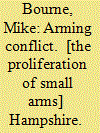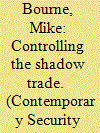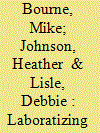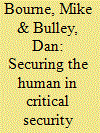|
|
|
Sort Order |
|
|
|
Items / Page
|
|
|
|
|
|
|
| Srl | Item |
| 1 |
ID:
079274


|
|
|
|
|
| Publication |
Hampshire, Palgrave Macmillan, 2007.
|
| Description |
xiv, 277p.
|
| Standard Number |
9780230019331
|
|
|
|
|
|
|
|
|
|
|
|
Copies: C:1/I:0,R:0,Q:0
Circulation
| Accession# | Call# | Current Location | Status | Policy | Location |
| 052674 | 327.1743/BOU 052674 | Main | On Shelf | General | |
|
|
|
|
| 2 |
ID:
105007


|
|
|
|
|
| Publication |
2011.
|
| Summary/Abstract |
From tackling illicit flows of small arms to combating nuclear smuggling, the shadow trade has become a central target of attempts to control the means of violence. This article argues that much of this practice and literature is framed in unhelpful terms that posit two distinct worlds, an upperworld and underworld, that separates illicit flow networks from the familiar world of state security policy. This implies that the possibilities for controlling the shadow trade are limited or require expansive and expensive controls. The article then examines the formation of illicit flow networks, drawing on examples including narcotics, small arms, nuclear materials, nuclear technology, major conventional arms, dual use technologies, and chemical weapons precursors; and finds that state and hybrid actors rather than extensive private networks are constitutive of illicit networks in many ways. It concludes by reclaiming hope for controlling the means of violence in this hybridity.
|
|
|
|
|
|
|
|
|
|
|
|
|
|
|
|
| 3 |
ID:
109878


|
|
|
|
|
| Publication |
2012.
|
| Summary/Abstract |
This article seeks to provoke a deeper engagement of Critical Security Studies with security's relations to technology and weapons. It explores existing assumptions about these relations in mainstream arms control and disarmament theory, and the way such assumptions are deployed and distributed in the current settlement of arms control and disarmament practice. It then draws on recent social and philosophical discussions of materiality, particularly on the thought of Bruno Latour, to propose a different set of concepts for exploring the aims and limits of arms control and disarmament. These concepts emphasise the mediating roles of material things in social relations and they may offer a richer view of the object of arms control (weapons and violence) and of the practices of arms limitation and reduction; one that may ultimately gesture towards a different understanding of arms politics, and that may be used to explore the transformatory potentials of arms control and disarmament.
|
|
|
|
|
|
|
|
|
|
|
|
|
|
|
|
| 4 |
ID:
140512


|
|
|
|
|
| Summary/Abstract |
This article critically interrogates how borders are produced by scientists, engineers and security experts in advance of the deployment of technical devices they develop. We trace how sovereign decisions are enacted as assemblages in the antecedent register of device development through the everyday decisions of scientists and engineers in the laboratory, the security experts they engage, and the material components of the device itself. Drawing on in-depth interviews, observations, and ethnographic research of the EU-funded Handhold project, we explore how assumptions about the way security technologies will and should perform at the border shape the development of a portable, integrated device to detect chemical, biological, radiological, nuclear and explosives (CBRNE) threats at borders. In disaggregating the moments of sovereign decision-making across multiple sites and times, we question the supposed linearity of how science comes out of and feeds back into the world of border security. An interrogation of competing assumptions and understandings of security threats and needs, of competing logics of innovation and pragmatism, of the demands of differentiated temporalities in detection and identification, and of the presumed capacities, behaviours, and needs of phantasmic competitors and end-users reveals a complex, circulating and co-constitutive process of device development that laboratises the border itself.
|
|
|
|
|
|
|
|
|
|
|
|
|
|
|
|
| 5 |
ID:
108671


|
|
|
|
|
| Publication |
2011.
|
| Summary/Abstract |
This article argues that Critical Security Studies (CSS), exemplified by Ken Booth's Theory of World Security, has outlined an ethics of security as emancipation of the 'human', but also a highly problematic security of ethics. After drawing out how the ethics of CSS operates, we examine the security of this ethics by examining it against a hard case, that of the 1998-99 Kosovo crisis. Confronting this concrete situation, we draw out three possibilities for action used at the time to secure the human: 'humanitarian containment', military intervention and hospitality. Assessing each against Booth's requirements for ethical security action, we counter that, in fact, no option was without risks, pitfalls and ambiguities. Ultimately, if any action to promote the security and the emancipation of the human is possible, it must embrace and prioritise the fundamental insecurity of ethics, or else find itself paralysed through a fear of making situations worse.
|
|
|
|
|
|
|
|
|
|
|
|
|
|
|
|
|
|
|
|
|